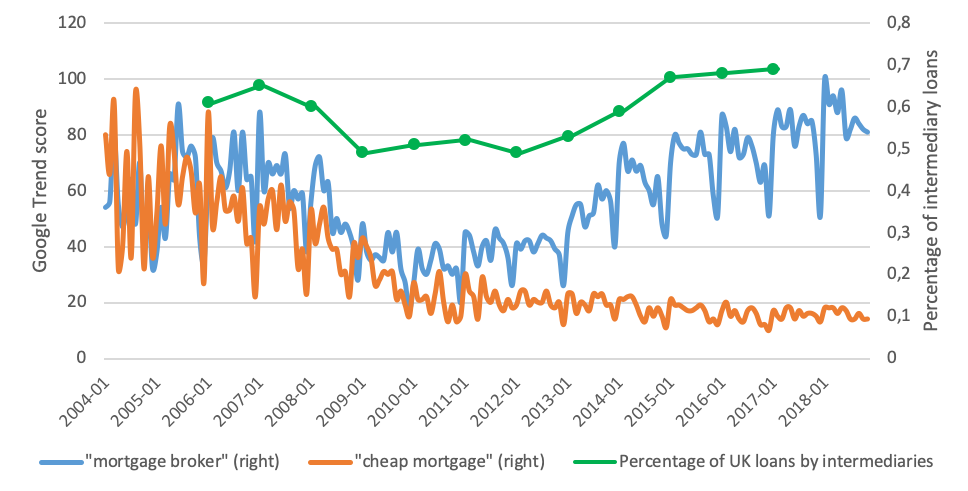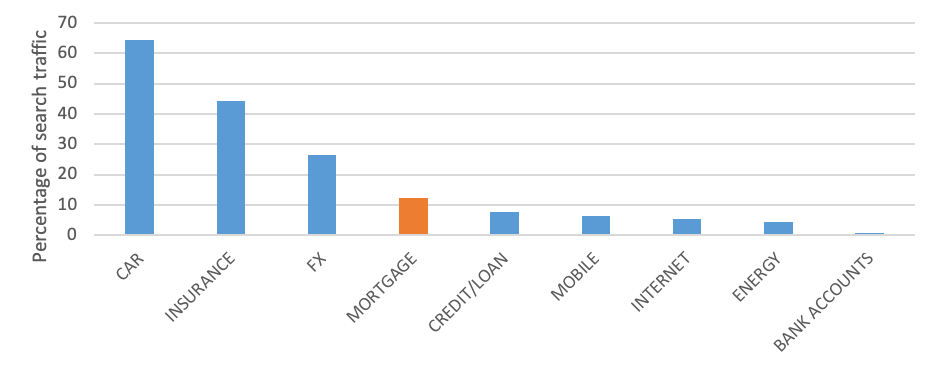More UK consumers are searching online to find a suitable mortgage broker, according to a new report from the Intermediary Mortgage Lenders Association (IMLA), as the emergence of new digital tools and services is becoming an increasing driver of intermediary mortgage business.
The IMLA report—‘The technological new frontier: digitisation in the mortgage market’—suggests that as the Financial Conduct Authority (FCA) and mortgage lenders themselves support the further digitisation of the market, consumers will gradually find it quicker, cheaper and smoother to access mortgage finance.
Mortgage brokers benefit from growing web traffic
An examination of Google Trends (Chart 1) finds that more people are looking for a broker online while fewer consumers are searching directly for the best mortgage deal. Indeed, in 2018 searches for “mortgage broker”—which now automatically highlight local mortgage brokers with a web presence at the top of any Google search—reached 14-year highs, increasing by 180% in five years (from a comparative search volume score of 22 in December 2013 to 62 in December 20181).
The growth in customers seeking information on mortgage brokers online has mirrored the growth of intermediary mortgage completions: over 70% of customers now source their loan through an intermediary when changing lenders2.
Chart 1: Comparison of keyword Google searches in the UK, 2004–present, plus % of loans sourced by intermediaries

Source: Google, UK Finance
The search findings complement research which suggests customers want a professional who can explain things. Three in five customers today would prefer to speak with an adviser about complex products, such as mortgages3.
Comparison websites make limited in-roads into mortgage journey
IMLA’s report suggests comparison websites have made limited inroads in the mortgage market, in contrast to other financial products such as car and home insurance.
It noted that the comparison websites only provide customers with a list of mortgage products from different lenders based on a very limited range of criteria such as LTV and borrower type. Also, there is no certainty that customers will qualify for the loans they have selected.
According to Amazon Alexa, more than half of all traffic to the top five5 UK price comparison websites comes through organic web searches. The lack of inroads in the mortgage sector can be illustrated by the lack of mortgage-related terms which are driving that traffic. By examining the top 100 organic keyword search terms which lead to referrals for each of the websites (Chart 2), it is clear that terms referring to both ‘cars’ and ‘insurance’ are significantly bigger drivers than ‘mortgage’ terms, which only account for around 10% of all organic traffic into the websites.
Chart 2: Search queries leading to organic traffic towards top five UK price comparison websites

Source: Amazon Alexa
Robo-mortgage broker revolution still a long way off
While 38% of brokers see the rise of robo-advice as the biggest threat to their business in the next three years5 , there are a number of barriers that stand in the way of firms seeking to implement a full robo-advice model.
Replicating the softer skills of a human broker, for example where the broker can appraise how well the customer understands the options on offer, will be difficult. IMLA’s own winter 2018 survey showed that 80% of members expect less than 5% of their mortgage business will be served by web-based robo-advisers by 2020.
The report notes that people’s lives frequently don’t fit into neat algorithms. Brokers often successfully challenge cases that are initially turned down by the lender for falling outside its criteria, and will know which lenders usually offer attractive product transfers at the end of an initial deal.
1 The scores awarded by Google Trends on the “interest over time” line graph express the popularity of that term over a specified time range. Google Trends scores are based on the absolute search volume for a term, relative to the number of searches received by Google.
2 UK Finance
3 Accenture for the CML (Digital Change and Mortgage Borrowers, June 2017)
4 According to estimates using data from Amazon Alexa, Moneysupermarket.com, Comparethemarket.com, GoCompare.com, Confused.com and Money.co.uk receive a mean average of 55.3% of their web traffic through search engines
5 Legal & General Mortgage Club (Value of a broker, November 2017)
Kate Davies, Executive Director of IMLA, comments
“We have already seen a number of digital advancements as the industry seeks out solutions to improve the mortgage and property transaction process. But we’re still some way from seeing a completely automated mortgage market as the technology cannot yet—and may never—fully address all customer needs.
“Our findings suggest that consumers clearly appreciate the softer skills offered by brokers. And online tools have made it easier for mortgage brokers to advertise their services and to be sought out by local property buyers seeking information and advice. The digital revolution hasn’t yet disrupted the traditional mortgage journey, but it’s certainly making it more effective.
“That’s not to say that change isn’t coming. Advancements in Artificial Intelligence and big data capture and manipulation are allowing more of the mortgage transaction process to be digitised. I’m sure we’ll see new and exciting developments in technology and delivery—and our members are very aware of the need to keep up to speed with what the market can provide and what consumers increasingly expect, so that they can stay ahead of the curve.
“Following the Mortgages Market Study, we have been working with the FCA to explore how improvements can be made to the way consumers find out about whether they are eligible for specific mortgage products. Constructing models which reflect the breadth of products and options across the market is very complex—and it’s clear that one size will not fit all situations. While we appreciate the FCA’s wish to enhance consumers’ experience, we think there is a risk that if it seeks to influence the direction of travel too strongly, it may actually inhibit the momentum which is naturally created in a competitive market.”
For further information please contact:
Lee Jones / Fran Hart / Andrea Borbely, Instinctif Partners
Tel: 0207 427 1400
Email: imla@instinctif.com
Notes to Editors
About IMLA
The Intermediary Mortgage Lenders Association (IMLA) is the trade association that represents mortgage lenders who lend to UK consumers and businesses via the broker channel. Its membership unites 42 banks, building societies and specialist lenders, including 16 of the top 20 UK mortgage lenders responsible for almost £180bn of annual lending.*
IMLA provides a unique, democratic forum where intermediary lenders can work together with industry, regulators and government on initiatives to support a stable and inclusive mortgage market.
Originally founded in 1988, IMLA has close working relationships with key stakeholders including the Association of Mortgage Intermediaries (AMI), UK Finance and the Financial Conduct Authority (FCA).